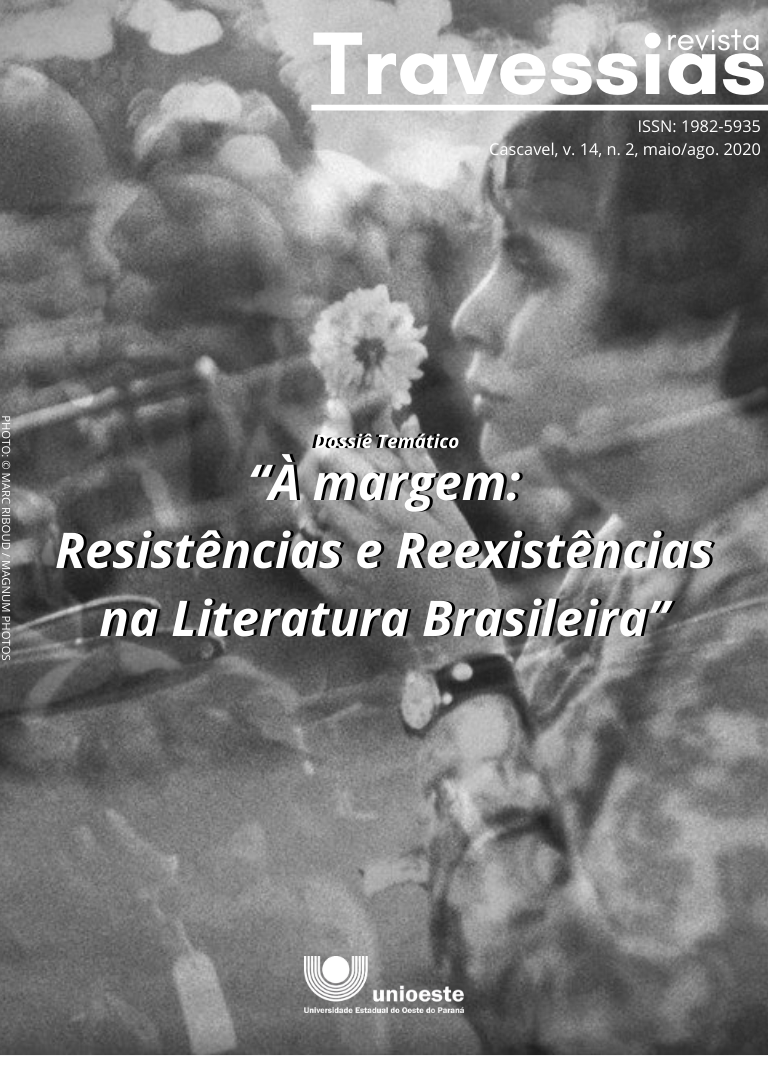Social abandonment, injustice and forgetfulness: the northeast brazilian’s identity and the hinterland in the works of Graciliano Ramos and Antônio Torres
DOI:
https://doi.org/10.48075/rt.v14i2.25518Keywords:
Hinterland, Graciliano Ramos, Antônio Torres, Northeast Brazilian.Abstract
Regarded as a study about minorities, Vidas Secas, by Graciliano Ramos, and Essa Terra, by Antônio Torres were compared seeking to comprehend the oppression of the northeast Brazilians’ identity. For this research, we read theories of representation of Hall (2006) and Cassirer (1992); the literary study Temposfuturos of Reis (2012); the study about the fiction and history of Brazil’s draught of Scoville (2011); the definition of counterculture proposed by Pereira (1986); and, at last, the identitary questions in Torre’s fiction of Preto-Souza (2019). Using images left in the cannon such as the draught and the poverty of Vidas Secas, the fiction of Torres can be understood as countercultural, as it problematizes the current system and the political status quo of the hinterland at the end of the 20th century. The work’s results showed that, while Graciliano bets on the silence and the draught, converging to the formation of the northeast Brazilian’s mythology and denouncing the political corruption and the institutional abandonment, Torres highlights the forgetfulness of the northeast cultural identity, among other social problems like xenophobia and exile related to the them.
Downloads
References
ALVES, H. E. Escritores e assassinos: os “homens de letras” nos romances de Graciliano Ramos. Cadernos do Instituto de Letras UFRGS, Porto Alegre, n. 58, p. 94-108, Outubro de 2019.
CANDIDO, A. Ficção e Confissão. 4. ed. Rio de Janeiro: Ouro sobre Azul, 2012.
CASSIRER, E. Mito e Linguagem. Perspectiva: São Paulo, 1992.
COELHO, A. et al. Retratos do sertão no vocabulário da obra essa terra, de Antônio Torres. In: Revista Graduando. n.2, 2011. Disponível em: http://www2.uefs.br/dla/graduando/n2/n2.129-140.pdf. Acesso em: 27 jan. 2020.
CUNHA, E. Os Sertões – Campanha de Canudos. São Paulo: Círculo do Livro, 1988.
FILHO, F.A.D. Sobre a palavra “sertão”: origens, significados e usos no Brasil (do ponto de vista da ciência geográfica). In: Ciência Geográfica – Bauru, 2011. Disponível em: http://www.agbbauru.org.br/publicacoes/revista/anoXV_1/AGB_dez2011_artigos_versao_internet/AGB_dez2011_11.pdf. Acesso em: 27 jan. 2020.
GIL FILHO, S.F. Geografia das formas simbólicas em Ernst Cassirer. In:. Visões do Brasil: estudos culturais em Geografia [online]. Salvador: EDUFBA; Edições L'Harmattan, 2012. Disponível em: http://books.scielo.org/id/8pk8p/pdf/barthe-9788523212384-04.pdf. Acesso em: 26 jan. 2020.
GONÇALVES, R.G. Memória e desencanto em essa terra, de Antônio Torres: um olhar crítico sobre o lugar do retirante nordestino. In: Anais do SILEL. Volume 3, Número 1. Uberlândia: EDUFU, 2013. Disponível em: http://www.ileel.ufu.br/anaisdosilel/wp-content/uploads/2014/04/silel2013_1556.pdf. Acesso em: 27 jan. 2020.
GUND, I.T.F. Por Essa Terra... destinos itinerantes: os caminhos do sujeito migrante em Antônio Torres. 2006. 122 f. Dissertação (Letras) – Universidade Federal de Juiz de Fora, Juiz de Fora.
HALL. S. A identidade cultural na pós-modernidade. 11.ed. – Rio de Janeiro: DP&A, 2006.
LAFETÁ, João Luiz Machado. 1930: A crítica e o Modernismo. São Paulo: Duas Cidades; 1974.
LAFETÁ, João Luiz Machado. O mundo à revelia. In: RAMOS, Graciliano. São Bernardo. 58. ed. Rio de Janeiro: Record, 1992. p.192-217.
LISPECTOR, C. A Hora da Estrela. Rio de Janeiro: Rocco, 1998.
PACHECO, Ana Paula. A subjetividade do Lobisomen (São Bernardo). Literatura e Sociedade, USP, p. 66-83, 2010.
PEREIRA, C.A.M. O que é contracultura. São Paulo: Nova Cultura/Brasiliense, 1986.
PONTES, E.T.M. Transições Paradigmáticas: do combate à seca à convivência com o semiárido nordestino. Universidade Federal de Pernambuco. Dissertação: 2010.
PRETO-SOUZA, A. Representação, Memória e Cultura: a composição do universo indígena em Meu Querido Canibal, de Antônio Torres. Universidade Federal do Rio Grande do Sul: 2019.
RAMOS, G. Vidas Secas. 86. ed. Rio de Janeiro/São Paulo: Record, 2002.
REIS, Z.C. Temposfuturos - Vidas Secas de Graciliano Ramos. In: Estudos Avançados. USP: São Paulo, 2012. Disponível em: https://www.scielo.br/scielo.php?script=sci_arttext&pid=S0103-40142012000300020&lng=pt&nrm=iso. Acesso em: 31 jul. 2020.
SCOVILLE, A.L.M.L. Literatura das Secas: Ficção e História. 2011. 241 f. Tese (Letras) – Universidade Federal do Paraná, Curitiba.
SEVCENKO, N. Literatura como missão: tensões sociais e criação cultural na Primeira República. 4. ed. São Paulo: Brasiliense, 1999.
TORRES, A. Essa Terra. São Paulo: Editora Ática, 1976.
TORRES entrevista superlibris [S. l.: s. n.], 2016. 1 vídeo. (12min 44s). Publicado pelo canal SescTV. Disponível em: https://www.youtube.com/watch?v=MaRTry6f_40. Acesso em: 26 jul. 2020.
ZILLY, Berthold. De sertões, desertos e espaços incivilizados. Rio de Janeiro: Mauad / FAPERJ, 2001.
Downloads
Published
How to Cite
Issue
Section
License
Creative Copyright Notice
Policy for Free Access Journals
Authors who publish in this journal agree to the following terms:
1. Authors keep the copyright and grant the journal the right of first publication, with the work simultaneously licensed under the Creative Commons Attribution License, which allows sharing the trial with acknowledgment of authorship and initial publication in this journal.
2. Authors are authorized to take additional contracts separately, for non-exclusive distribution of the work version, published in this journal (eg publish in institutional repository or as a book chapter), with acknowledgment of authorship and initial publication in this journal.
3. Authors are allowed and encouraged to publish and distribute their work online (eg in institutional repositories or on their personal page) at any point before or during the editorial process, as this can generate productive changes, as well as increase both impact and citation of the published trial (See The Effect of Free Access).
Creative Commons License
This work is licensed under a Creative Commons Attribution–NonCommercial-shareaswell 4.0 International License, which allows you to share, copy, distribute, display, reproduce, completely or part of the work, since there is no commercial purpose, and authors and source are cited.



